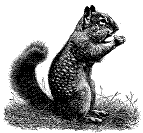Vertebrate Pest Conference: Proceedings

Vertebrate Pest Conference Proceedings: 12th (1986)
Date of this Version
3-1-1986
Document Type
Article
Abstract
Islands are notorious for the ease with which the balance of their natural communities can be upset by the introduction of organisms from other areas. Introduced species can establish themselves quickly and successfully at the expense of native flora and fauna because the usual checks to their increase found in their home environments are often absent on islands. Many island organisms are ill-fitted to withstand predation by or competition with introduced organisms. A characteristic of some island species that increases their vulnerability to introduced predators is their relative "fearlessness". As Darwin (1845) prophetically wrote when describing the extraordinary tameness of Galapagos animals: "... What havoc the introduction of any new beast of prey must cause, before the instincts of the indigenous inhabitants have become adapted to the stranger's craft or power." On the Galapagos, as with other remote islands lacking native predator populations, selection for behavior in native species which leads to their avoidance of predators has been relaxed and island fauna are often at their mercy.

